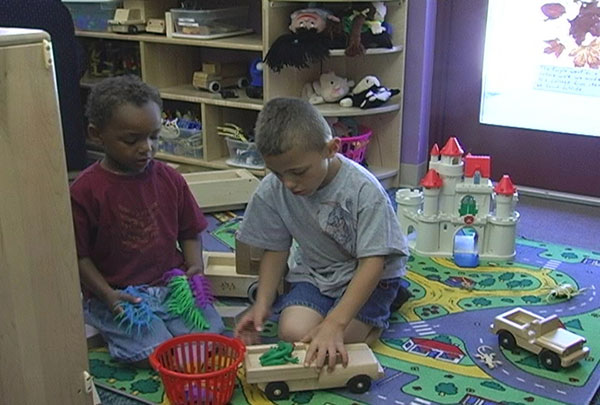Video Transcript for The Importance of Play
Dr. Jeffrey Trawick-Smith, Professor of Early Childhood Education, Eastern Connecticut State University: Play is an activity that young children do every day, and we all know that it’s important. But did you know that research shows that play is actually central to young children’s learning? What can you do to help children get the most learning from their play?
The Importance of Play (0:31)
Dr. Trawick-Smith: When you look at play, when you watch children play, it’s pretty obvious that it’s a really enjoyable, fun activity for children; it probably is what makes childhood so enjoyable. What is not as obvious, maybe, is how important play is for children’s development. Research has found that play helps children to think creatively. They learn all kinds of different problem solving strategies when they play. Play has been linked to language development, and certainly it leads to positive social skills. One of the more important things that research shows is that play is related to reading and learning to write.
Dr. Trawick-Smith: One way that play helps children in literacy areas is that it’s very symbolic. For example, when they’re using a toy telephone to represent a real phone, they’re using a symbol. That’s not unlike looking at a word and seeing that it represents something that’s not present or something in real life.
Pretend Play (1:36)
Dr. Trawick-Smith: One element of play that I think is important to observe in children is pretend or make-believe. One thing you want to watch for as you’re watching children play is: do they engage in make-believe? Do they take on the roles of pretend characters or other people in their lives? Do they use objects in make-believe ways? Do they invent imaginative play situations to play out with their peers? There are a variety of ways that adults can kind of enhance this kind of pretend. One really enjoyable way to do this is simply to play along with children, to actually take a make-believe role, play parallel or with children to make play suggestions, to ask questions, to kind of encourage this kind of role playing.
Teacher: Do you know how much it’s going to cost to get my car fixed? Jayden?
Social Interaction During Play (2:29)
Dr. Trawick-Smith: A second element that I think is important for adults to look at when they’re observing children’s play is social interaction, and related to that, verbalization—using language as you’re interacting with your peers.
Child 1: I need another long one.
Child 2: There is no more long ones.
Dr. Trawick-Smith: You want to see a lot of language in this kind of play setting.
Child 2: Don’t worry, maybe we can do this?
Child 1: NO……no
Child 2: This is a long one.
Dr. Trawick-Smith: Take a role; try to facilitate more language by asking questions; try to facilitate some peer interaction.
Play Complexity (3:11)
Dr. Trawick-Smith: A third element of play that I think is important for adults to look for is what has sometimes been called “play complexity.” As children get a little bit older into the preschool years, what you like to see is a greater variety of enactments as they’re carrying out a role. If children aren’t playing that kind of complex play, if they’re still quite simple and repetitive in their make believe or in other kinds of play that they engage in, it might be time for an adult to move in and facilitate.
Teacher: Sounds like you’re playing house? Are you playing house?
Dr. Trawick-Smith: Again, through question-asking, maybe suggesting some new enactments to perform will help the play to become more complex.
Teacher: What’s this baby’s name?
Dr. Trawick-Smith: One thing I’d like to be sure to caution about is that playing with children is great fun and so all of these strategies to facilitate play will be very enjoyable for the adult as well as the child. The thing we have to be careful about, though, is not to stay too long, to overstay our welcome. But to be sure that after a period of enriching children’s play, we get out of the play center to allow them to play on their own. We need to be very respectful of children’s play activities.
Dr. Trawick-Smith: When you enhance children’s play in these ways, when you facilitate their pretend play, the complexity of their play, social interactions—not only are you enhancing their play, but this leads directly to overall advancement in children’s development. Play is wonderful tool for parents and teachers to use, a wonderful vehicle for promoting larger areas of development.
Child: Um, fifty-two.
Teacher: Fifty-two?
© 2009 Center for Early Childhood Education at Eastern Connecticut State University
May be reprinted for educational purposes.



